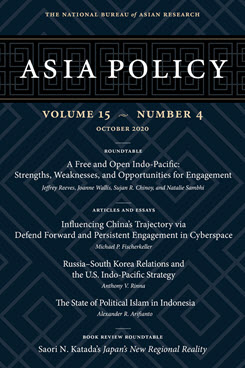Indonesia’s Indo-Pacific Vision
Staying the Course in a Covid-19 World
This essay examines the evolution of Indonesia’s Indo-Pacific thinking, major developments since the election of President Joko Widodo (Jokowi) in 2014, and the future of the country’s regional leadership amid new 21st-century challenges, particularly Covid-19.
EXECUTIVE SUMMARY
MAIN ARGUMENT
Indonesia’s outlook as a maritime state has matured over the past decade. Under the Jokowi government, important shifts have occurred in the country’s thinking about the Indo-Pacific with implications for maritime policy. In particular, Jokowi has shown a greater focus during his second term on establishing a material legacy—including by upgrading infrastructure, developing human resources, boosting lagging economic growth, and relocating the capital—rather than a visionary one. While Indonesia’s relentless pursuit of multilateralism is necessary to promote regional cooperation and balance strategic rivalry, much of the administration’s attention has been diverted to addressing the economic fallout and public health pressures of the Covid-19 pandemic. Nonetheless, Indonesia’s concerted effort to be an active regional player, given its size and historical nonalignment, remains critical.
POLICY IMPLICATIONS
- The current Covid-19 crisis and heightened strategic competition in the Indo-Pacific in recent years mean that Indonesia will continue to strenuously pursue multilateralism to balance the influence of both the U.S. and China and to maximize stability and scientific cooperation.
- Slowing economic growth and increased strain on the country’s health system due to the pandemic will limit some of Jokowi’s goals for his second term. Yet, given the country’s centrality to the Indo-Pacific construct and the importance of maritime security for the archipelago, the administration cannot afford to divert its focus from the Indo-Pacific.
- Indonesia’s failure to develop a coherent response to Indo-Pacific maritime security issues can be traced back to the militarization of its foreign policy. This trend is unlikely to change during the president’s second term, given the prominence of former army generals as advisers in the cabinet.
Natalie Sambhi is Executive Director of Verve Research and a PhD scholar focused on Indonesian military history at the Australian National University’s Strategic and Defence Studies Centre (Australia).
About Asia Policy
Asia Policy is a peer-reviewed scholarly journal presenting policy-relevant academic research on the Asia-Pacific that draws clear and concise conclusions useful to today’s policymakers. Asia Policy is published quarterly in January, April, July, and October and accepts submissions on a rolling basis. Learn more


